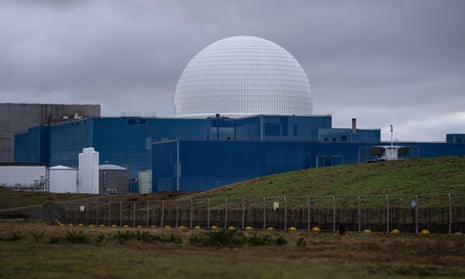MPs have warned that a planned fleet of small nuclear reactors are unlikely to contribute to hitting a key target in decarbonising Britain’s electricity generation, as the government opened talks to buy a site in Wales for a new power station.
The Environmental Audit Committee (EAC) said that ministers’ approach to developing factory-built nuclear power plants “lacks clarity” and their role in hitting a goal of moving the grid to clean energy by 2035 was unclear.
Last year a body, Great British Nuclear, was launched with the aim of delivering new power stations, including a fleet of small modular reactors (SMRs). The government has spent £215m on developing SMR design and is running a competition for companies to bid for government contracts.
The government hopes SMRs will make nuclear power stations easier and cheaper to build.
However, in examining the role of SMRs, the EAC heard that a final investment decision on the first station in the UK is not expected until 2029. The timeline means it is unlikely to contribute to the 2035 target, or Labour’s pledge to run the grid on clean energy by 2030.
Great Britain’s electricity is largely generated through gas-fired power stations, as well as windfarms. Nuclear offers a steady source of power, but most of the country’s plants are due to retire over the next decade.
The EAC said that the government plans to create as much as 24 gigawatts of nuclear power by 2050, but this figure could be as low as 12GW. Critics of nuclear power argue that it is costly and slow to build, and that projects to store wind and solar power in large batteries could undermine the need for it as a reliable power source.
Philip Dunne, the chair of the EAC, said: “The UK has the opportunity to be a genuine world leader in the manufacture of SMR nuclear capability with great export potential.
“However, despite pledging hundreds of millions of pounds in support for SMR projects and undertaking to invest in the construction of the UK’s first SMR, the government’s overall vision for the sector at this stage lacks clarity.
“The first SMR is unlikely to be in operation by 2035, the date ministers have set for decarbonising the electricity supply: so what role will SMRs have in an energy mix dominated by renewables and supplemented by existing and emerging large-scale nuclear?”
On Monday, it emerged that the government is in early-stage discussions to acquire a nuclear site on the island of Anglesey or Ynys Môn.
Hitachi owns the site but its future has been uncertain since 2020, when the Japanese company formally abandoned its own effort to build a reactor there after failing to agree financial support with the government.
after newsletter promotion
Ministers now hope to strike a deal with Hitachi to acquire the land, with the intention of finding a partner to develop a nuclear power station there. The Wylfa site has been valued at £200m, according to the Financial Times, which first reported the talks between Hitachi and GB Nuclear.
Wylfa is home to the last of the UK’s Magnox nuclear reactors, which closed in 2015, meaning it is deemed a suitable site for a large reactor or a small modular reactor (SMR). Britain’s plans for energy projects are under the spotlight, after Labour was forced to row back on a plan to invest £28bn a year in green projects.
There are also concerns that delays to projects, such as Hinkley Point C in Somerset, may hit electricity generation just as households and businesses move towards electricity for everything from home heating to electric cars.
A spokesperson for the Department for Energy Security and Net Zero said: “We have ended the stop-start approach to nuclear and recently launched a roadmap setting out the biggest expansion of the sector in 70 years, simplifying regulation and shortening the process for building new power stations – meaning cleaner, cheaper and more secure energy in the long-term.”
